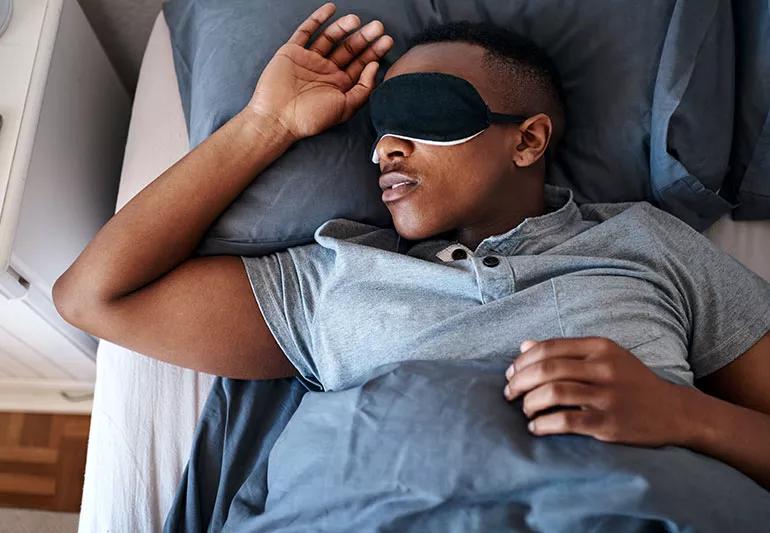Here's why you might want to give it a try

With the promise of taking “beauty sleep” to the next level, sleep masks are available in a variety of shapes, sizes and materials. But do they help you sleep better?
Advertisement
Cleveland Clinic is a non-profit academic medical center. Advertising on our site helps support our mission. We do not endorse non-Cleveland Clinic products or services. Policy
“It depends on the person,” says sleep expert Samuel Gurevich, MD. “People need to find out what works best for them. A safe, calm environment is important for a good night’s rest, and blocking out light is part of that. Eye masks can help, especially if your normal sleeping time is during the day.”
Dr. Gurevich discusses getting your best rest by using eye covers for sleep.
A sleep mask is a fabric eye mask used for sleeping benefits. And while Dr. Gurevich says there isn’t a lot of research supporting their effectiveness, anecdotally, they seem to help.
“Staying alert is the body’s response to a dangerous environment. Thousands of years ago, the people who fell asleep easily, especially if it was loud and busy outside, were the ones eaten by the saber-toothed tigers. Those who were appropriately alert survived, and so did their genes,” explains Dr. Gurevich.
“That’s why many need their environment just right to fall asleep. It normally needs to be safe, comfortable and without a lot of stimulation, including artificial light or a TV playing in the background,” he continues. “Eye masks can help achieve this because they create that dark, quiet room.”
Dr. Gurevich says that while anyone could benefit from wearing a sleep mask, you may find them particularly useful if you:
Advertisement
“Putting on an eye cover for sleep can be part of a calming bedtime routine that conditions your brain to recognize everything’s safe, calm and comfortable. Your routine tells the brain it’s time to shut off and let sleep come,” says Dr. Gurevich.
Because sleep masks can help you fall asleep faster, they may increase the amount of sleep you get. Good quality sleep can improve your:
“Longer-term benefits of good healthy sleep include a decreased risk of cardiovascular disease and stroke,” adds Dr. Gurevich. “Sleep is one of the unsung heroes of our health. We tend to take it for granted and borrow from it, but it affects every part of your life.”
Dr. Gurevich recommends choosing a mask for sleep that feels comfortable. “It’s a highly individualized decision. Some people like a soft, fuzzy surface. Others prefer a shiny one,” he says. “There are also people who find good results from cooling or heating eye masks.”
Your sleep mask should fit not too tightly and remain comfortable even when you sleep on your side. “Focus on what feels the best instead of what looks the best, and you’ll find the right eye mask for you.”
Advertisement
Learn more about our editorial process.
Advertisement

Sleep disorders, mental health conditions and other health concerns can all affect the quality of your sleep

Most people fall asleep within 10 to 20 minutes, but if your experience is different, adjusting your sleep schedule may help

Stick to a consistent schedule, be mindful of screen time and work on reducing your stress levels before bed

Napping can boost focus, memory and mood — if you time it right
These devices can help shed light on what’s happening with your body during rest

Keep a dream journal, set your intentions before bed and make sure you’re getting a full night of high-quality sleep

Controlling your dreams may help you tap into your creativity and even reduce anxiety

A 15- to 20-minute power nap is best to boost alertness — beware napping longer than an hour

Wearing a scarf, adjusting your outdoor activities and following your asthma treatment plan can help limit breathing problems

Your diet in the weeks, days and hours ahead of your race can power you to the finish line

When someone guilt trips you, they’re using emotionally manipulative behavior to try to get you to act a certain way